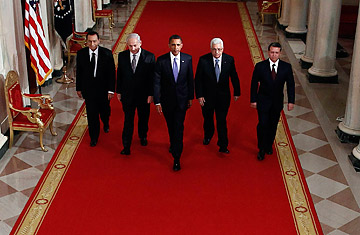
Egyptian President Hosni Mubarak, Israeli Prime Minister Benjamin Netanyahu, U.S. President Barack Obama, Palestinian President Mahmoud Abbas and Jordan's King Abdullah II, from left, walk through Cross Hall on their way to the East Room to give a joint statement on the Middle East peace talks at the White House on Sept. 1, 2010
(2 of 2)
Netanyahu has professed his readiness to make a historic compromise, but that may not mean the same thing to him as it does to Abbas. The Israeli Prime Minister entered office arguing it was futile to try to implement a political deal to end the conflict in the immediate future. Instead, he advocated "economic peace," focused on easing the conditions of life in the West Bank to enable economic and administrative development, creating an infrastructure for long-term Palestinian coexistence with Israeli neighbors. Even getting Netanyahu to use the words Palestinian state took some doing by the Obama Administration. He eventually complied in a speech last year but added conditions unacceptable to Abbas or any other Palestinian leader.
With Hamas in control of Gaza, the Israelis envisage regime change in the coastal strip as a precondition for progress. And given the state of Palestinian politics, Netanyahu aides argue, it's naive to imagine that Abbas could seal a deal that resolves the Israeli-Palestinian conflict. So the current talks are viewed not as a decisive settling of accounts with the Palestinians but an application of what Israeli leaders once called a "political horizon" to a strategy of cooperation, in order to boost Palestinian well-being and good governance in the West Bank while leaving Gaza festering to force Palestinians to reject the path of Hamas.
The Bush Administration embraced this view and had Abbas spend a year in open-ended conversations with then Prime Minister Ehud Olmert, aimed at achieving what was (rather unfortunately) dubbed a "shelf agreement" — a reference to its destination, as the world waited for a better day on which it would be implemented.
Although even a shelf agreement eluded Abbas and Olmert (a more centrist leader than the hawkish Netanyahu), the Obama Administration's framework-agreement concept may not be all that different. It's about creating hope on the deferred horizon while changing the status quo by increments.
Deferring Palestinian statehood will exasperate Abbas and moderate Arab regimes, because they believe its framework had been well established in previous rounds of talks. Still, a framework agreement may be the best the Obama Administration can get as long as it seeks consensus with Netanyahu. Optimists in Washington may hope that, like getting Netanyahu to say the word state, an agreed framework for the future will be perceived as progress.
The real lesson of the past two decades, however, is that the situation on the ground trumps the conversation among negotiators. And over those two decades of talks, Israel's settler population doubled and its political median moved steadily to the right, while Abbas was irrevocably weakened by the diminishing returns of his negotiation strategy. Even as the new conversation starts, Hamas is killing settlers, and the more militant settlers are no doubt planning their revenge. It may take more than framework talks to prevent the situation on the ground from turning very nasty very quickly.
